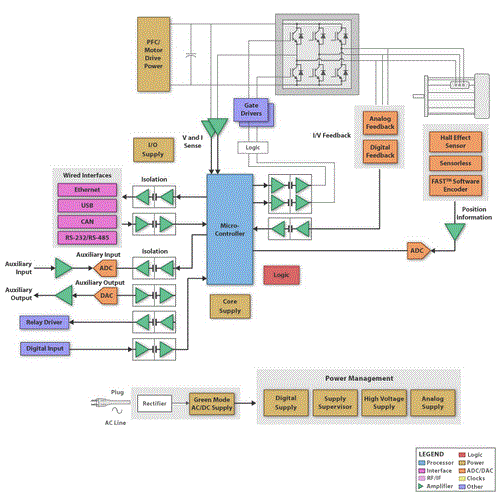
Design Considerations
AC Induction Motor Overview
The AC induction motor (ACIM) is the most popular motor used in consumer and industrial applications. The motor is highly reliable, as its simple design has no brushes that could wear out, and it can be manufactured at a very low cost. Another key feature is that the rotor does not have any moving contacts, which eliminates sparking. The ACIM is less efficient than other motor types, however.
ACIM speed depends on the frequency of the AC input voltage and the number of poles in the stator windings. AC induction motors are available in single-phase and three-phase versions; three phase is an ideal choice for variable-speed applications.
Microcontrollers
TI's Stellaris™ C2000™ and Hercules™ microcontroller (MCU) families are ideal for controlling an AC induction motor. All of these MCU families can be used for implementing scalar or vector-control techniques.
C2000 MCUs are ideally designed for real-time operation and have high-resolution pulse-width modulators (PWMs) for precise control of gate drivers. The dual sample-and-hold, 12-bit, high-speed analog-to-digital converters (ADCs) can sample any sensor inputs with high precision.
The combination of high-performance PWMs and ADCs guarantees a low torque ripple and highly efficient motor control. The powerful C2000 MCU core architecture enables fast execution of mathematical algorithms for controlling the motors with vector control.
Stellaris MCUs are based on the widely used ARM Cortex M3 core and have all motor-control-related peripherals integrated on board. Stellaris MCUs have a 10-bit ADC and motor-control-specific PWM to provide efficient control of the motor. On-board communication peripherals such as USB and Ethernet enable the MCU to act as a networked controller that can perform motor control as well.
The RM4 and TMS570 Hercules Safety MCUs are based on the widely used ARM Cortex R4F core and are built to ease the development and certification of safety critical systems. The RM4 and TMS570 Hercules Safety MCUs have a up to 2x 12-bit ADC. The flexible HET Co-Processor delivers motor-control-specific PWM to provide efficient control of the motor. On-board communication peripherals such as USB, Ethernet and CAN enable the MCU to act as a networked controller that can perform safe motor control as well.
Isolation
TI digital isolators have logic input and output buffers separated by TI's silicon dioxide (SiO2) isolation barrier, providing 4 kV of isolation. Used in conjunction with isolated power supplies, these devices block high voltages, isolate grounds, and prevent noise currents from entering the local ground and interfering with or damaging sensitive circuitry.
Interface/Connectivity
Traditional analog RS-232/RS-485 interfaces remain popular choices for motor control applications. Looking forward, designers are integrating mainstream interfaces such as Ethernet, USB and CAN into their products. TI is committed to providing solutions for both traditional and emerging industrial interfaces. For example, TI recently introduced the ISO1050, the world's first isolated CAN transceiver.
Power Management
Texas Instruments offers power management IC solutions ranging from standard ICs to high-performance, plug-in, power-brick, digital-power MOSFETs and integrated power modules.
From AC/DC and DC/DC power supplies, linear regulators and non-isolated switching DC/DC regulators to PMICs and power and display solutions, Texas Instruments power management IC solutions can help you complete your project.
Learn more about the parts featured in this solution:
- TMS320F28026F – Piccolo Microcontroller with InstaSPIN-FOC
- DRV8301 – 3-Phase Brushless Motor Pre-Driver with Dual Current Sense Amps and Buck Converter
- TLK110 – Industrial 10/100 Ethernet PHY
- TMDSHVMTRINSPIN – High Voltage Motor Control Kit with InstaSPIN-FOC and InstaSPIN-MOTION enabled Piccolo MCU

Buy these parts now at Mouser Electronics:
Learn MORE about Industrial Automation Solutions from Texas Instruments
Advertisement
Learn more about Texas Instruments





